Term Page
Detention 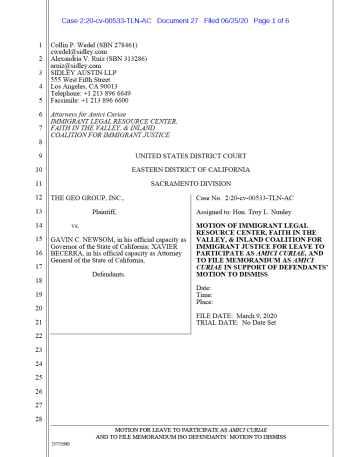
The ILRC teamed up with community-based organizations Faith in the Valley and the Inland Coalition for Immigrant Justice, to file an amicus brief in support of California’s defense of SB 29 in GEO v. CA. SB 29, codified at Cal. Civ. Code § 1670.9 and co-sponsored by the ILRC and Freedom for Immigrants, was passed in order ensure that the community would have a voice on an issue which so critically impacts them; immigration detention. Our amicus details the importance of community engagement, as detailed in recent community battles to halt three new proposed immigration detention centers. Many thanks to Sidley Austin LLP for its generous support in the amicus.

This Practice Advisory is a detailed follow-up to our prior Practice Alert on the Supreme Court's April 23, 2020 decision in Barton v. Barr, 140 S. Ct. 1442 (2020). In Barton, the Court held that committing an offense “listed in” the inadmissibility grounds at INA § 212(a)(2) triggers the "stop-time" rule for purposes of cancellation of removal eligibility, even for an admitted LPR who cannot be charged as removable under the inadmissibility grounds. This Advisory provides an in-depth discussion of the Barton decision, focusing on legal arguments to push back against overreaching DHS efforts seeking to trigger the stop-time rule, legal arguments and trial strategies to prevent conduct that did not result in conviction from triggering the stop-time rule, and considerations for criminal defense lawyers representing immigrants in criminal proceedings.
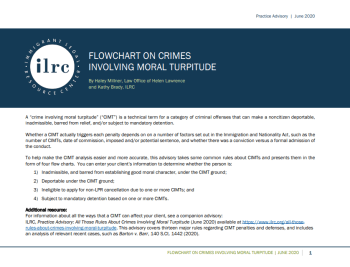
Penalties for crimes involving moral turpitude (CIMTs) are based on several factors, such as the number of CIMTs, date of commission, imposed and/or potential sentence, and whether there was a conviction versus admission of the conduct. The result is that determining whether a CIMT penalty actually applies can be quite complex. This set of four flow charts can be used to answer four questions about a case: is the particular person deportable; inadmissible or barred from establishing good moral character; barred from applying for non-LPR cancelation; or subject to mandatory detention, based on CIMTs?

The COVID-19 pandemic demands a bold, urgent public health response for incarcerated communities. Even before this health crisis, California’s jails, prison system, and immigration detention centers were dangerously overcrowded and medically negligent. The Dignity not Detention Coalition, in partnership with CURB, JusticeLA, and Human Impact partners, created A Budget to Save Lives, a community-based decarceration strategy which presents intersectional reforms in five key areas including: Jail population reduction, prison population reduction, immigration detention population reduction, youth decriminalization & decarceration, and community-based services & alternatives to incarceration. Now more than ever before, it is imperative that California divest from criminalization and incarceration and invest in cost and life-saving solutions for the health and wellbeing of our communities.
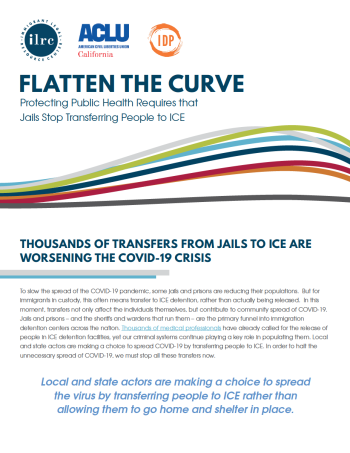
Jails and prisons are the primary funnel into immigration detention centers across the nation. Instead of letting people who are due for release from custody go home, jails transfer them to ICE. During this pandemic, these transfers to ICE not only affect the individuals themselves, but contribute to community spread of COVID-19. Local and state actors are making a choice to spread the virus by transferring people to ICE, rather than allowing them to go home and shelter in place. In order to halt the unnecessary spread of COVID-19, we must stop all these transfers now. The resource below is available with both a national and CA-specific focus.
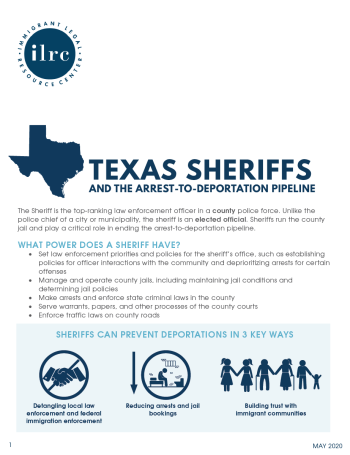
As a local elected law enforcement official and operator of county jails, Sheriffs play a critical role in ending the arrest-to-deportation pipeline. This advisory for advocates in Texas explains the power of county sheriffs, and measures they can take to reduce the number of people being funneled into the deportation pipeline, without violating state laws like SB 4.
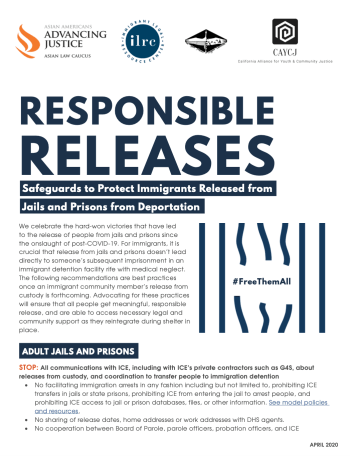
As more and more jurisdictions are contemplating releasing people from jails and prisons, it is critical that we consider ways to ensure that people released are not immediately transferred to the harmful deportation system. ILRC, together with our allies, Asian Prisoners Support Committee, Asian Americans Advancing Justice – Asian Law Caucus, and California Alliance for Youth and Criminal Justice, put together this list of recommendations that advocates can use to demand responsible releases.

The Department of Homeland Security uses government contracts to acquire immigration detention services. This graphic explains the procurement process, or the competitive bidding process, that government agencies use to purchase services from private contractors and how DHS can use this process to enter into contracts with private prison corporations.
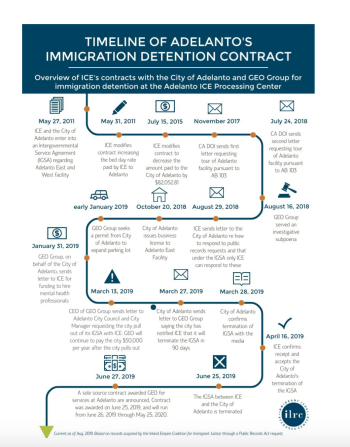
This timeline provides an overview of ICE’s contracts with the City of Adelanto and GEO Group for immigration detention services at the Adelanto ICE Processing Center and how those contracts have evolved over time.